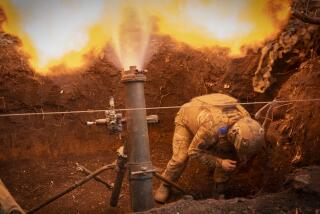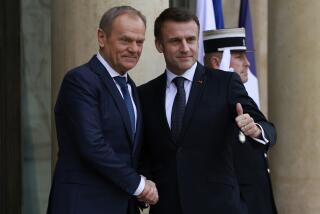From the archives: Offers Philosophy, Relentless Energy
PARIS -- With the same vigor and vision with which he has set about reforming the Soviet Union, President Mikhail S. Gorbachev is now embarked on reshaping Europe for the 21st Century.
Gorbachev is offering ideas--a philosophy, even--rather than a preset formula. But at home his ideas are already remaking a revolution and remaking a nation.
He has no blueprint for the new Europe, no plan for what he calls “the common European home,” not even an agenda for negotiations beyond broad topics such as disarmament, environmental protection and economic cooperation, but this is an idea that is beginning to catch on here and elsewhere in Western Europe.
What Gorbachev is offering is his own relentless energy. And in his visit to France this week he made clear his determination to work for sweeping political and economic changes in Europe.
Declaring that the Cold War is over, he proposes that the armed camps formed in that era disarm and eventually disband as political trust replaces military power as the basis of security--or, as Gorbachev put it here this week, “the doctrine of restraint replaces the doctrine of deterrence.”
“It is time to consign to oblivion the Cold War assumptions that viewed Europe as an arena of confrontation, divided into ‘spheres of influence,’ someone else’s ‘forward-based defenses,’ as an object of military confrontation, as a theater of war,” he said, offering Europeans the glimpse of a future where there no longer would be even the fear of war.
Instead of a continent divided between East and West, between socialist and capitalist, Gorbachev envisions a community of individual nations, each with its own culture, history and political-economic system, but all engaged “in the process of the joint creation” of a unified Europe.
“Europeans can meet the challenges of the coming century only by pooling their efforts,” he told the 23-nation Council of Europe in Strasbourg, France, on Thursday as he set out hopes for the Continent. “We are convinced that what they need is one Europe, peaceful and democratic--a Europe that maintains all its diversity and common humanistic ideas, a prosperous Europe that extends its hand to the rest of the world, a Europe that confidently advances into the future. It is in such a Europe that we visualize our own future.”
And to those who ask whether the Soviet Union, more expansionist than Czarist Russia ever dared to be and more zealous in spreading socialism than its neighbors would tolerate, is ready to live in such a community and abide by its rules, he offers his own domestic reforms, known as perestroika, as proof of Soviet sincerity--and as a challenge to potential partners.
Changing the Country
” Perestroika is changing our country, advancing it to new horizons,” Gorbachev said. “That process will continue, extend and transform Soviet society in all dimensions--economic, social, political and spiritual, in all domestic affairs and human relations. . . .
“As a result, you and your governments, your parliaments and your peoples will soon be dealing with a totally different socialist nation than has been the case before. And this will have, and cannot but have, a favorable impact on developments through the entire world.”
This is not the sweeping, soaring vision of a philosopher or poet, but that of a bold politician convinced of the need for far-reaching changes that break sharply with the past but that are still realistic and pragmatic.
“The ‘idea of Europe,’ as the French like to put it, is really armchair stuff, something to talk about over a fine Armagnac,” Prof. Alexander O. Choubarian, director of the Soviet Institute of World History, a key Kremlin think tank, commented in an interview here.
“Our idea of the ‘common European home,’ as Gorbachev has called it, is a dynamic one that invites participation,” he said. “Gorbachev has posed the question, and it is also a challenge: ‘What kind of Europe do you want to live in?’
“He is giving his own answers, and we can see the dynamism beginning to work. . . . Pay attention: Europe is being reshaped, history is being made.”
Following his talks with President Francois Mitterrand, the Soviet leader expanded his proposal for a pan-European summit, with the United States and Canada also participating. He suggested that it convene within the next two years to ratify an agreement reducing conventional armed forces on the continent and then discuss the major problems facing Europe as well as the “future stages of progress toward a European community of the 21st Century.”
Gorbachev’s starting point for all this is deceptively simple: Through the impact of its own reforms, the Soviet Union is generating changes in other countries in Europe and throughout the world. And to Gorbachev’s mind, these add up to a historic opportunity to reshape Europe.
‘Let’s Act Together’
“The world is not static--when we act, you react, and when you act, we react,” Vadim Zagladin, one of Gorbachev’s foreign policy advisers, said during the Soviet visit here. “Now we are proposing, ‘Let’s act together, break out of that old game of action-reaction and try to build something new.’ ”
Through its weight as a superpower, its leadership in the socialist world, its economic potential and the vigor of its “new political thinking” and willingness to rethink virtually all past positions, the Soviet Union feels that it can alter the international balance of power, particularly in Europe, as it proceeds with its reforms.
But Moscow needs partners if it is to create a different environment around it in Europe, as Gorbachev explained in Strasbourg, and that is the current focus of Soviet diplomacy here.
The prolonged confrontation of the past four decades was ruinous for the Soviet Union, and continuing it would preclude his own country’s economic reconstruction and the improvement of its citizens’ living standards.
With international tensions reduced substantially, the Soviet leadership believes that it can cut its military spending by as much as half, expand economic ties to spur its development and open itself to the world to bring in new ideas.
Gorbachev made clear that the Soviet Union understands the price for such a detente will be high--and that Moscow is ready to pay it.
He acknowledged that the democratization of the socialist countries of Eastern Europe could lead not only to a multi-party system, as is emerging in Hungary and Poland, but even to the loss of power by the ruling Communist parties.
“The social and political order in some particular countries changed in the past, and it can change in the future as well,” he said. “But this is exclusively a matter for the peoples themselves, for their choice.”
Going further, he ruled out “any interference in the internal affairs, any attempts to limit the sovereignty of (other) states, whether friends and allies or somebody else.”
This not only ended the so-called “Brezhnev doctrine,”(named after the late Soviet President Leonid I. Brezhnev) which Moscow has used to justify its intervention in other communist countries to defend the gains of socialism there against “counterrevolution,” but it also abandoned the decades-long Soviet effort to protect itself with buffer states in Eastern Europe.
Answering another frequent criticism of Soviet policy--its willingness to sacrifice basic human rights out of political expediency--Gorbachev said Moscow’s commitment to human rights was now firm and solid.
“A world where military arsenals would be reduced but where human rights would be violated would not be a safe place,” he declared in what seemed almost an echo of Western statements. “We have made this conclusion for ourselves, once and for all.”
Gorbachev said the reassessment that led to these and other equally profound policy shifts “did not come easy and sometimes was downright painful.”
But the net result, he argued here and in Strasbourg, was a liberation from the “vicious circle of ‘action-reaction’ in East-West relations”--a new freedom of action that he believes can be used in reshaping Europe.
In the first address by a Communist leader to the Council of Europe, he declared: “I strongly believe that it is high time that Europeans brought their policies and their conduct in line with a new rationality--not to prepare for war, not to intimidate one another, not to compete in improving weapons . . . but rather to learn to make peace together, and together to lay a solid basis for it.”
More to Read
Start your day right
Sign up for Essential California for news, features and recommendations from the L.A. Times and beyond in your inbox six days a week.
You may occasionally receive promotional content from the Los Angeles Times.






